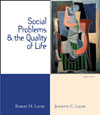 |  Social Problems and the Quality of Life, 8/e Robert H. Lauer,
U.S. International University
Jeanette C. Lauer,
U.S. International University
Family Problems
Internet Exercises- It can be interesting to contrast the way different organizations address
areas of social concern, such as family problems. For a conservative view of
family problems, visit the Website of the Family Research Council. (http://www.frc.org)
Look at the topics included on the homepage to get a sense of the kinds of issues
being addressed. Next, on the top left corner of the homepage, click on "I.E.
Webzine" and look over some of the articles listed to get a sense of their
content. Then, to get what might be called a "mainstream perspective,"
access the Family.com Website (http://family.go.com/)
and explore it. Again, check out topics, articles, and the issues being addressed.
- To compare the perspectives of the two sites, find rough correspondences
between the two with respect to any two of the following topics:
family planning, abortion, child raising, media content, homosexuality,
teen concerns, and family activities.
- In a sentence or two, try to characterize the primary differences between
the perspectives you find on the two sites.
- Explore the University of Colorado's Family Sociology Resources Website
(http://osiris.colorado.edu/SOC/RES/family.html)
to see the types of resources included. Under "Resources for Family Researchers,"
select "Kearl's Guide to the Sociology of the Family." Read through
the presentation under "Marriage and Family Processes."
- Considering what Stephanie Koontz has to say (under "What is a Family"),
briefly outline the original and emergent meanings of the family concept.
- Sociologically, why should it matter how the concept of family is defined?
- Considering the "Benefits of Family Life," what does Yankelovich
(a poll survey researcher) find regarding the ratings Americans give to
family life?
|
|



 2002 McGraw-Hill Higher Education
2002 McGraw-Hill Higher Education